In the ever-evolving landscape of digital marketing, Search Engine Optimization (SEO) continues to remain a cornerstone of online success. One of the critical aspects of SEO involves managing and optimizing inbound and outbound links. While natural links created organically are beneficial, unnatural links can significantly harm a website’s rankings. Addressing issues related to unnatural links is essential for maintaining a website’s credibility and visibility in search engine results.
Unnatural links are those that are intended to manipulate a website’s ranking in search engine results. These links often come from low-quality directories, irrelevant guest posts, or paid link schemes, and they violate Google’s Webmaster Guidelines. When search engines detect such links, the affected site may face penalties, causing a dramatic drop in its visibility and traffic.

Understanding the Impact of Unnatural Links
Search engines like Google aim to provide users with the most relevant and trustworthy content. To maintain this standard, they scrutinize the backlink profiles of websites. If a website is found to be participating in manipulative link practices, it can trigger a manual action or algorithmic penalty.
These penalties can result in:
- Lower rankings or complete removal from search engine indexes
- Loss of organic traffic and potential revenue
- Damage to online reputation and brand trust
- Wasted marketing investments on ineffective or harmful strategies
Why Addressing Unnatural Links Matters
There are several reasons why webmasters and SEO professionals must take the issue of unnatural links seriously:
1. Search Engine Penalty Avoidance
By identifying and removing or disavowing unnatural links, a website can avoid severe penalties. Google’s Penguin algorithm and other manual review processes are designed to detect these infractions, and failing to address them can be detrimental to long-term online performance.
2. Improved Website Credibility
A website that consistently receives high-quality, relevant backlinks is viewed as credible. In contrast, artificial linking can signal poor-quality content, leading to decreased trust from both users and search engines.

3. Better SEO Performance
Cleaning up a backlink profile not only helps avoid penalties but also enhances a site’s overall SEO. When a site is linked naturally by authoritative sources, the domain gains trust and relevance in the eyes of search engines, resulting in improved rankings and visibility.
4. Future-Proofing Your SEO Strategy
The algorithms that search engines use are constantly evolving. A site relying on shortcuts today may find itself penalized tomorrow. Proactively addressing unnatural links helps ensure that the site remains compliant and competitive no matter how the SEO landscape changes.
How to Identify and Address Unnatural Links
Addressing issues with unnatural links begins with a comprehensive backlink audit. Tools like Google Search Console, Ahrefs, and SEMrush provide insights into the types of links pointing to your site. Look for signs of unnatural behavior such as:
- Links from irrelevant or unrelated sites
- Anchor text that appears overly optimized
- Suspiciously high number of links from low-quality domains
- Sudden spikes in backlink acquisition
Once identified, there are two primary actions to take:
- Contact Webmasters: Reach out to the source sites to request link removal.
- Disavow Links: Submit a disavow file to Google to indicate that certain links should not be considered as part of your link profile.
It’s also a good practice to establish ongoing monitoring to prevent issues from arising in the future.
Conclusion
Unnatural links pose a critical threat to any SEO strategy. The penalties associated with such links can be severe and long-lasting. However, with diligent oversight, regular auditing, and adherence to best linking practices, it’s possible to protect and even enhance a site’s rankings and credibility. In today’s highly competitive digital marketplace, taking action against unnatural links is not just advisable—it’s essential.
Frequently Asked Questions (FAQ)
- What are unnatural links?
Unnatural links are backlinks that are created with the intent of manipulating a site’s ranking in search engines. These often breach search engine guidelines and can lead to penalties. - How do I know if my site has unnatural links?
Use SEO tools like Google Search Console, Ahrefs, or SEMrush to audit your backlink profile and look for patterns such as irrelevant site links, over-optimized anchor text, or low authority backlinks. - What is a disavow file?
A disavow file is a list of URLs or domains submitted to Google to inform them not to take certain links into account when assessing your site’s link profile. - Can unnatural links be removed completely?
In many cases, contacting the webmasters of linking sites can lead to link removal. Otherwise, submitting a disavow file is the recommended alternative. - How often should I perform a backlink audit?
It’s advisable to perform a backlink audit at least every 3 to 6 months, or after any major update to your SEO strategy.



Leave a Reply